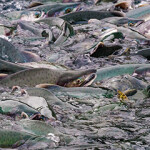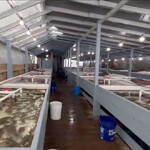Opposition arises to American Aquafarms' net-pen proposal in Maine

An group of residents of the U.S. state of Maine have announced their opposition to an American Aquafarms proposal to grow up to 30,000 metric tons (MT) of Atlantic salmon in closed net-pens located near the town of Gouldsboro.
American Aquafarms President and CEO Mikael Rones told SeafoodSource soon after the project’s announcement he chose Maine due to its natural resources and the aquaculture industry’s potential in the state. The company purchased an East Coast lobster facility in Gouldsboro, Maine, in October 2020, with plans to establish a hatchery, fish farm facilities, and a processing plant.
“We looked at several areas over the U.S., and to us, we feel Maine is the right place based on water temperature and the potential of the industry in Maine. These are the two main reasons why we are there,” Rones said.
At the time, Rones also said that local support of the project was key.
“We are trying to go into these communities with respect. It’s important we are humble when we are going in. We want this to be a collaborative process, but [we know] resistance can happen,” he said. “We’ve been pretty clear we’re trying to work with and not against the locals and that we want to respect their wishes [and earn] support from them. We are working closely with them so the build-up is done in a way that doesn’t harm any other industries over there.”
A press release from the group opposing the project indicates that local support from some residents may be a tough sell.
“This is simply a matter of the wrong place, the wrong technology, and the wrong people,” Hancock, Maine resident James Paterson, one of the leaders of the effort, said in a release announcing his opposition. “This project represents the industrialization of a pristine bay in the shadow of Acadia National Park. It is a totally inappropriate place for this kind of development – it’s like putting a large factory at the foot of Cadillac Mountain.”
The proposed net-pens, planned to be located in an area known as Frenchman’s Bay, would be within roughly 20 miles of Acadia National Park. In addition to being near the park, the farm would also be in an area that, according to the group's press release, “has been home to a robust lobster fishery, small-scale aquaculture, commercial and recreational boating, and other compatible uses.”
“A number of towns and hundreds of families also depend on the health of the bay for their livelihood,” Paterson said. “It now supports a vibrant lobster fishery and emerging small independent oyster, mussel, and kelp farms, but the likelihood of dumping more than 50 million pounds per year of animal feed and antibiotics into these waters could have disastrous consequences for decades to come. Anyone who suggests otherwise is either trying to fool others, or fooling themselves, or both. “
Part of the group’s opposition to the project, according to the release, has to do with Rones’ past. According to the group, Rones was convicted of multiple counts of fraud in Norway, for which he was sentenced to four years in prison and forced to pay restitution of NOK 15 million (USD 1.7 million, EUR 1.4 million).
Rones, in an interview with the Bangor Daily News, confirmed the charges and said he “made some promises” that he could not keep. For his crimes, he spent two-and-a-half years at a minimum-security prison in Norway.
“I am very open about my past,” he told the newspaper. “I accept full responsibility for my actions and have paid my debt to society.”
American Aquafarms is aware of the emerging opposition, and remains committed to working with the local community, American Aquafarms Spokesperson David Farmer told SeafoodSource.
“American Aquafarms is committed to an open, inclusive, and transparent process for the development of our leading-edge technology in Maine,” Farmer said. “We want to be good partners in the community, and believe that our project will create good jobs without putting at risk the quality of life in coastal Maine. We welcome any opportunity to speak with interested parties regarding our proposals, and invite both supporters and opponents to contact us directly if they have questions or concerns.”
Project opponents said they are unconvinced that American Aquafarms’ “closed pen” technology will be able to safeguard the environment in Frenchman’s Bay.
“Massive sea pen arrays like the ones being proposed by Mr. Rones have no place in Frenchman’s Bay, no matter how different he says they are,” Ted O’Meara, a public affairs consultant working with the group, said.
Farmer said the concerns raised about the project do not come as a surprise to the company.
“We expected that there would be some concerns raised about the project, and we are fully prepared to follow Maine’s strict regulatory requirements for aquaculture for this project,” Farmer said. “Through that project, we will demonstrate the effectiveness of our technology and the importance we place on operating in a way that protects Maine’s environment.”
Opponents vow that they will continue to reach out to other stakeholders and will work “closely with local and statewide organizations that also are expected to join the fight” to oppose the project’s state and federal permitting.
Photo courtesy of American Aquafarms






Share